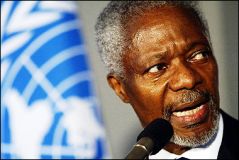Sudan continues attacks in Darfur despite peace commitments : Annan
UNITED NATIONS, Apr 18, 2005 (AP) — The government of Sudan is still battling rebel groups in the country’s Darfur region despite numerous agreements to stop the fighting, U.N. Secretary-General Kofi Annan said in a report released Monday.
 The report said Darfur has seen little improvement in the last month.
The report said Darfur has seen little improvement in the last month.
According to Annan, while attacks on civilians declined, violence against international personnel rose and the region saw more military activity by the government and its Janjaweed militia allies, as well as by rebel groups.
“The killing of civilians and combatants alike must stop and a genuine cease-fire must be observed,” Annan said.
The monthly report, delivered to the U.N. Security Council, said March saw a rise in “banditry, looting and hijacking of vehicles.” Three attacks in particular were troublesome, including one on March 22 that seriously wounded a U.S. foreign aid worker, Annan said.
In mid-March, the U.N. pulled staff from four western areas of the Darfur region because of threats against foreigners and other staff.
An estimated 180,000 people have died in the conflict since February 2003, when two non-Arab rebel groups took up arms against the Arab-dominated government to win more political and economic rights for Darfur’s African tribes.
In January, a U.N. Commission of Inquiry said crimes against humanity – but not genocide – probably occurred in Darfur and recommended cases be referred to the International Criminal Court. It drew up a sealed list of 51 alleged perpetrators, including very high-level Sudanese officials, rebels and Arab Janjaweed militiamen.
Since then, the Security Council has passed three resolutions on Sudan , two directly aimed at ending the crisis in Darfur.
The first created a U.N. peacekeeping mission to monitor a deal that ended a 21-year conflict in southern Sudan unrelated to Darfur. The council hopes that agreement will also help Darfur move toward peace.
The second strengthened an arms embargo on Sudan’s Darfur region to include the government and ordered an asset freeze and travel ban on those who defy peace efforts in the conflict-wracked area. The third authorized the prosecution of Sudanese war crimes suspects by the International Criminal Court.
In the report, Annan warned of the possibility that Sudanese who believe they may be on the list of suspects handed to the court could resort to attacks against the U.N. and international aid groups.
Annan’s report did note some positive steps: There were fewer attacks against civilians, while humanitarian assistance is reaching more people. Aid workers have been able to get to several remote areas as well, he said.
